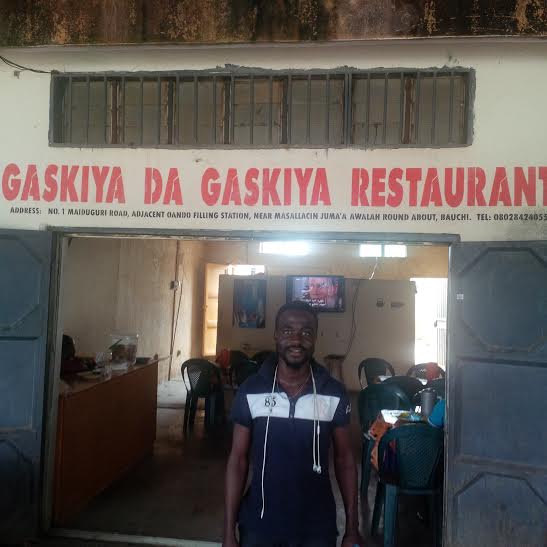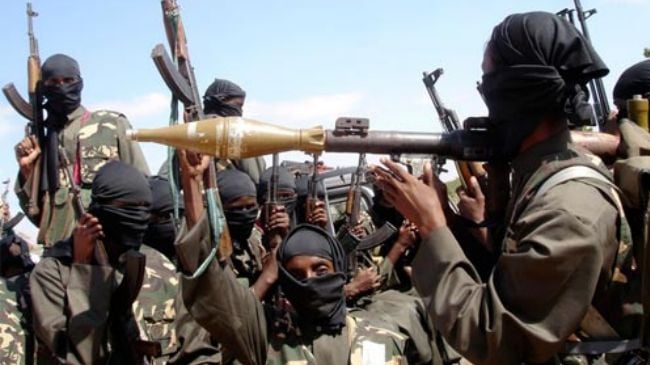On the road to Maiduguri.
“Maiduguri? To do what?!” My neighbour screams, when, walking by my room, she sees me arranging my shirts in a bag; and upon asking, I tell her where I am off to.
“Why would you want to kill yourself?” she asks, casting an unpleasant gaze at me.
Maiduguri, Nigeria’s north-east Borno State capital, has been tagged as the hotbed of terrorism in Nigeria. In a 2011 article titled ‘Maiduguri: Nigeria’s city of fear’, BBC’s Andrew Walker explains that “no one in the Nigerian city of Maiduguri knows who to be afraid of most, a group of Islamist militants known as Boko Haram or the police.
Advertisement
“The sect, thought to have been eliminated after a brutal uprising in 2009 in which hundreds of people were killed, is back and its members want revenge.”
Boko Haram’s seeming recurrent attacks, since 2009, have killed thousands and rendered more than a million homeless in the north-east region of Nigeria. As of April 2015, the Internal Displacement Monitoring Centre (IDMC) estimated that “1,538,982 people forced to flee their homes in Nigeria were still living in displacement” and that “the increase in the first half of 2015 of the number of internally displaced persons (IDPs) in Nigeria was due to ongoing violence in the north-east… The biggest rise in the number of IDPs was registered in Bornu state, one of the three north-eastern states most affected by Boko Haram violence, followed by Adamawa and Yobe.”
The Displacement Tracking Matrix (DTM), as of April 2015, also identified 1,491,706 IDPs in these north-eastern states where, of course, Boko Haram insurgency has been the predominant cause of displacement.
Advertisement
The Nigerian government has since set up IDPs camps across the capital towns of the states affected. To find out the current state of the bereaved at the IDPs camps and what their intentions are going forward, and to document the mood and urgent needs – regarding welfare and security – of these IDPs, are my cardinal objectives, I tell my neighbour who insists, nonetheless, that the trip is unsafe.
I shouldn’t set out to visit displaced persons in Maiduguri with empty hands, this thought sticks. A week to my scheduled take-off from Lagos, I called on a few friends to help with relief materials and this call yielded two bags of toiletries and clothing.
DEAD END
On the evening of the twenty-fourth day of September, 2015, I arrive in Abuja, where I am expected to connect another flight to Maiduguri. Unfortunately, however, what I have left on me is not enough to pay for the Abuja-Maiduguri flight ticket.
“I am going to abort this journey,” I tell my friend who has come to pick me at the airport to his home where I will spend the night.
Advertisement
“And what happens to this stuff for the IDPs,” he asks, raising an eye at me and then at the two bags sitting on the car’s back seats. “I heard there are one or two camps here in Abuja, I can always drop these things there,” I tell him.
“But, the IDPs in Maiduguri are more in need,” he says. “Those here are a little bit fine with feeding and relief materials, unlike those in the worst hit zone. Why not go by road and see to the accomplishment of this mission?”
Dawn, the next day, we set for the Mararaba Park, where my friend drops me for a bus going to Maiduguri. Pulling over by the gate, the boys who work at the Park rush at my loads, and through the muddy pathway, they move the bags to the bus which they claim needs only one more passenger to take off. They tell me that for my loads, I will be paying N3,500, the exact passenger’s fare. The luggae is heavy and will consume quite some space in the bus, they say. I attempt, unsuccessfully, to negotiate with them.
Standing with arms akimbo, trying to figure things, a soft hand taps me from behind. “Are you going to Maiduguri?” She asks, with a flash of smile.
Advertisement
“Oh, yes,” I say, masking my worries with a smile.
“Good, I will sit with you, so that this journey won’t be boring.”
Advertisement
I raise my eyes at her, trying to see if I can pick the face, of this beautiful young lady who talks to me as though we’ve known each other for years. Maybe she’s a Facebook friend who is quick to recognize me? No, she’s not.
“I am Femi,” I tell her.
Advertisement
“Oluwafemi right?” She calls out the full name, smiling.
“My name is Jash,” she continues.
Advertisement
“Jash? Is that an English name?” I am curious.
“No,” she says. “It is tribal. Jashilagari in full. God’s gift, Ebunoluwa in Yoruba,” she says with excitement.
“Oh, where are you from?” I ask her again. “I’m Margi from Mubi in Adamawa State. I grew with some Yoruba friends, and that’s why I know the Yoruba meaning of my name.”
We are deep into the conversation. Jash is a medical student in Georgia. She’s home for the holidays, and has been moving between Maiduguri, where her parents are, and Abuja at her sister’s. “I flew when I was coming to Abuja, I just decided to return by road – as the flight schedules ain’t even regular,” she tells me.
Since the insurgency escalated, the airport in Maiduguri was closed down and had just been reopened in June, and only a very few airline operators had returned to business here. In a statement, the Nigerian Defence spokesman said: “The airport was shut after an assessment of the security situation and the realisation that such a massive airlift of passengers was not proper in view of the security threat in the area.”
I tell Jash I’m taking these loads to the internally displaced persons in Bornu State, and she is awed by the seeming kindness. She tells me her village, too, in Mubi, had been attacked by the insurgents. And then, she intervenes. She starts to protest on my behalf – that the boys reduce the amount charged for the loads. One of the boys starts to scream at her. The exchange was in Hausa language, beyond my comprehension. I move closer. “What’s he saying, why is he shouting at you?” I ask Jash, and she turns at me, smiling: “I will tell you when we take off.”
THE JOURNEY TO MAIDUGURI
11:46am. We are many hours into the journey. The scenery, of the vegetation’s lushness especially, as we drive through Nassarawa and Kaduna, holds my attention. Shortly after leaving the Kaduna by-pass, we see a police roadblock a few kilometers ahead. Our driver, a middle-aged man, maintains his speed and wouldn’t slow down, until the policemen all aim their guns at our bus.
“You are very stupid,” the police corporal says, approaching the driver’s door and ordering him to pull over at the other side of the road. “Can you try this nonsense in Yobe?”
He, again, orders that all passengers – mostly women – to disembark. “Can you try this in your Yobe where Boko Haram is killing everybody?” the corporal screams, angrily again, walking to the back of the bus. “Untie these loads!”.
The bags are being tied to the boot, and considering the arduousness of getting these things arranged and tied at the Park in Abuja, the driver feels reluctant to begin to untie them. Where are the hands that would help rearrange and tie them back? The question he’s unable to ask. He starts to beg the corporal and we, the passengers, join in begging, too. The corporal insists, and when the driver begs on, he brings out a razor blade from his chest pocket and he starts to cut the ropes that tied the bags to the bus. My two bags of relief materials and other passengers’ bags fall from the bus onto the ground, and we all stand by the bus, still begging. After much more pleas, we are freed. The driver checks everywhere in the bus for spare ropes to re-tie the bags but he does not find any. The only alternative is to be sandwiched with these bags on our seats, and leg-space.
We drive through the scenically attractive Jos. Jash tells me of how she enjoys viewing the beautiful plateaus in Jos from the sky when she travels by air. At the bumpy bypass, kids and women rush at our bus, marketing their wares, fresh fruits. “When you see people hawking very fresh fruits, just know that you are in Jos,” Jash says, beckoning one of the kids for banana.
We lay over in Bauchi, to eat, stretch legs and for Muslims passengers to observe the Zuhr and Asr prayers combined.
“By 6pm, we should be in Maiduguri,” Jash calms me with a pat on my shoulder after noticing my nervousness. “Oh no, we won’t drive through Chibok, Damboa and Sambisa,” she says, laughing, when I ask her.
Jash is soft-spoken and receptive. She shares many stories with me; school life, and love life. She tells me of how much she worries about the insurgence that had stolen their homes, their happiness and their lives. When she finishes her medical studies in Europe, she doesn’t think she will return to Maiduguri to practice. Maiduguri, to Jash, now looks like a place of horror than the peaceful home she knew it to be.
“And why was that guy at the Park in Abuja shouting at you?” I ask Jash. “Oh, he was abusing me o. He said how can I just meet someone for the first time and we are already in love that I now protest on his behalf,” she says, and we both start to laugh.
I share my earpiece with her, and I play some RnB songs on my device as we look forward to seeing Maiduguri. A few minutes past 5pm, we stop at Potiskum for one of the passengers to alight.
“Is this driver moving fast?” Jash asks me. I nod. “The most dangerous part on this road is Damaturu-Maiduguri,” she says. “It’s a long drive through thick bushes. You watch it, when the driver gets there, he will move much faster. That’s the point BokoHaram has always launched attack on this road,” she says, and I shiver, a little.
Almost two hours, driving through Potiskum, I notice Jash. She looks worried. “We may not get to Maiduguri today,” she says, with a sigh. “When it’s 6pm and we are not close to Maiduguri, we will have to stop in Damaturu, pass the night, and continue the journey tomorrow,” she tells me.
“Damaturu? I don’t have any plan to stay in Damaturu,” I say. When I mean no plan, the little budget I’m moving with does not cover hotel and other expenses in Damaturu. “I am going to come down in Damaturu,” Jash says. “I can’t risk it,” she adds. And again, I shiver, a little.
Her phone rings. It’s her mum. She is calling to tell her that she should stop in Damaturu, and sleep over at a relative’s. Soon, a friend, who is awaiting my arrival in Maiduguri calls me. “Are you in Maiduguri,” he asks? “Heading Damaturu, just leaving Potiskum,” I tell him. “Ha!”
His voice rises almost to a scream. “You can’t get to Maiduguri today if by this time you’re still where you mentioned. Because when it’s 7pm, the road is closed. And please, even if the driver insists on moving on to Maiduguri, step out of the bus when you get to Damaturu, I beg you.” As soon as he drops the call, another friend, a military personnel, who has offered to pick me at the City Gate in Maiduguri calls me. “Oh, please sleep in Damaturu, you can’t make Maiduguri today again,” he says as I tell him we are yet to reach Damaturu at 6:30pm.
I lower my head, worried.
7:15pm, we zoom into Damaturu. The driver veers into a large yard by the roadside. Yobe Line Terminus, the gate reads. We meet many other buses already parked in the yard. The driver turns off the engine, jumps down and walks off. I help Jash with her luggage out of the bus, and we stand in front of the bus, waiting for her relative who’s on her way to pick her.
“How do I get to any hotel here?” I ask. She does not really know. “Commercial vehicles, kekes and bikes are off road when it’s 6pm in Damaturu. But I will ask my relative when she arrives,” she says.
FOUR BULLETS IN THE CHEST
Soon, a guy, tall, heavy-chested, walks in our direction, the large-screen phone in his palm lightens his face – dark and not too friendly. He had sat on the row in front of us through the journey from Abuja. We figure he is a soldier when, at every military checkpoint – from Bauchi – he makes two-finger signals to the military men, and in return, they hail him and beckon us to move on.
“Officer officer,” Jash, smiling, flags her hand across his face. He stops, and he smiles at us.
“Are you serving here?” I ask, stretching my hand at him, for a handshake. “Yes,” he nods. His phone rings, he answers and tells the guy at the other end to come and pick him.
“Seems you’ve been away for a long time?” I ask him. “Yes,” he smiles, adding: “I went for treatment.”
“Were you shot? Are you one of the combatants fighting BokoHaram?” I ask.
He smiles. “Give me your hand,” he says. He picks my index finger, pulls his t-shirt up a bit, and puts my finger somewhere below his chest. I feel it; hollow, hard, roughened skin. “Four bullets entered through that place”, he says.
I, abruptly, withdraw my finger. While we drove past a checkpoint in a village, a Corpa’s Lodge-signboard calls Ngelzama, I see what now remains of the attacked Corpa’s Lodge, and I scream, calling Jash’s attention to it. The building was burnt from the first block to the last. Only the signboard survived, and still stands there.
“You see that place that made you scream that time? That was where the attack started, and down to Benisheik. I was shot. Many soldiers died. Many soldiers. I will never forget that day, December 1, 2014,” the soldier tells me. “I am a gunner,” he continues. “I operate an armor tank. I was out-powered by these BokoHaram guys. I, and a few others, narrowly escaped.”
He brings out his phone, and shows me the picture of his wounds when they were fresh, the holes that bullets had left on the tank he operates, his friend who died in that battle, and then a truck loaded with lifeless bodies of soldiers.
I shut my eyes, restraining them from his phone. “Were these soldiers’ family compensated?” I ask, teary-eyed. “Compensate? Some of their families don’t even know that their husband, son, has been killed in this fight against BokoHaram,” he says.
“Weren’t they given state burial?” I ask. “For where?! They just dig a wide grave and pack all of them inside,” he says, letting out a smile.
“What?!” I scream. He smiles on.
“My friend, soldiers are the ones used as sacrifice. No one cares. From Abuja, N150,000 monthly allowance is approved for each soldier here in Yobe and Borno, but how much do we get? Just N30, 000. Where’s the remaining N120, 000? Well, I am a soldier. I will fight on. It is a vow I have made. I was trained as a killer. I was also trained to die, and I have embraced death many times.”
I tell him why I’m going to Maiduguri. I tell him I do not even know how to get an affordable hotel to sleep for the night in Damaturu. “Oh, that’s not to worry,” he says. “One of my guys should come to pick me, you can join me so we pass the night at his place. I don’t want to go to our base, until tomorrow. I have actually overstayed the time I was given. So, even when I show up at the Division tomorrow, I might be dismissed,” he says.
“But you went to treat yourself, why fear a dismissal for resuming back late?” I ask. “You don’t know the rules here,” he tells me, smiling.
It is getting darker. Jash’s relative arrives. She introduces me as a friend she had met on board. The relative asks that I join Jash, too, to spend the night at her home, since I know no one in Damaturu. While they move towards the car, I stay with the soldier. My spirit has already aligned with his. Jash leaves, and I stay with the soldier. Exgee – that’s his name.
Exgee brings out a packet of cigarette from the back pocket of his jean trouser, and offers me a stick. “The things wey Boko Haram don do this town ehn,” he says, puffing hard on his cigarette. “There was a time in this Damaturu, for about three days, the people you will see on the streets are either Boko Haram members or soldiers. It was an everyday open fire. I can’t count the numbers of terrorists I killed.”
2 comments








I’m impressed by the humanity in everyone of the people you got closer to along on the journey: Jash, Exgee, & Isa. We the people indeed are one big family. We just need to work on a few outliers amongst us. May God help us build a better Nigeria.
Your comment..what a nice travelogue!